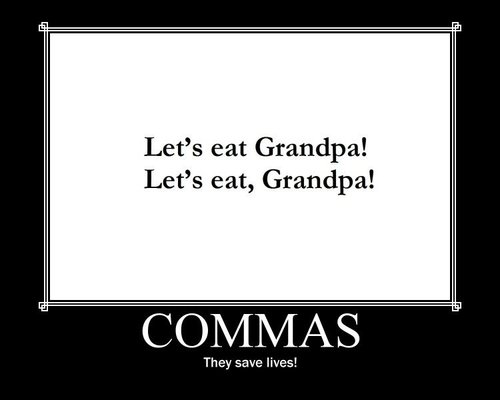The word for bear in various languages
P.S.: Now it makes sense why this special agent is called Oso. 🙂
P.S.: Now it makes sense why this special agent is called Oso. 🙂
Here is another story that shows how commas are important..
A panda walks into a café. He orders a sandwich, eats it, then takes out a gun and fires it at the other patrons. “Why?” asks the confused, surviving waiter, as the panda makes towards the exit. The panda produces a badly punctuated wildlife manual and tosses it over his shoulder.
“Well, I’m a panda,” he says, at the door. “Look it up”. The waiter turns to the information on pandas in the manual and finds an explanation. “Panda. Large black-and-white bear-like animal, native to China. Eats, shoots, and leaves.”.
The poorly punctuated manual caused all of these problems for the panda and the people in the café. The correct punctuation for the last sentence in the story should not include any commas (simply eats shoots and leaves).
Thanks to Lucy with ESL Podcasts for such a good article.
Guys at PM Hut (amazing blog on project management) came up with a great list of the 32 most commonly misused words and phrases.
Although the post is titled Even a Project Manager Needs Good Grammar, I believe such list can work as a good ‘flashcard’ for anyone including those who studies either for SAT or GRE exams.
Some notable of those words are quoted below:
Affect/Effect – The way you “affect” someone can have an “effect” on them. “Affect” is usually a verb and “Effect” is a noun.
Complement/Compliment – I often must compliment my wife on how her love for cooking perfectly complements my love for grocery shopping.
Discreet/Discrete – We can break people into two discrete (separate) groups, the discreet (secretive) and indiscreet.
Elicit/Illicit – Some people post illicit things on message boards to elicit outrageous reactions from others.
Flair/Flare – A flair is a talent, while a flare is a burst (of anger, fire, etc.)
Inflammable – Don’t let the prefix confuse you, if something is inflammable it can catch on fire.
Imply/Infer – A reader infers what an author implies. In other words, when you imply something, you hint at it. When you infer something, you draw a conclusion based on clues.
Literally – If you say “His head literally exploded because he was so mad!” then we should see brains splattered on the ceiling.
Lose/Loose – If your pants are too loose you may lose them. That would be almost as embarrassing as misusing these two words.
Percent/Percentage – The word “percent” should only be used when a specific number is given. “Percentage” is more of a general term.
Stationary/Stationery – You are stationary when you aren’t moving. Stationery is something you write on.
Unique – Something can’t be “kind of unique” or even “very unique.” It’s either one of a kind or it isn’t. There is no in between when it comes to unique.
Lie/Lay – After you lay the books on the table, go lie down on the couch.
Allude/Elude – When someone alludes to something in conversation (indirectly references), if you aren’t paying attention the meaning may elude you (escape you).

Commas are definitely important. Another good example when commas could change the meaning is defining and non-defining relative clauses.
Anticipate means to expect and prepare for something when expect does not include the idea of preparation.
In other words “to expect” means looking forward to the outcome that you “should” get and “to anticipate” means looking forward to the outcome that you “want” to get.
For example:
Also there is a good quote from Dictionary.com:
Expect, anticipate, hope, await all imply looking to some future event. Expect implies confidently believing, usually for good reasons, that an event will occur: to expect a visit from a friend. Anticipate is to look forward to an event and even to picture it: Do you anticipate trouble? Hope implies a wish that an event may take place and an expectation that it will: to hope for the best. Await (wait for) implies being alert and ready, whether for good or evil: to await news after a cyclone.
I was always wondering what the difference between “quick” and “fast” is.
And it looks like:
Also there is another interesting example to understand the difference better:
This is a video with a woman who imitates 21 different English accents, including British, Irish, Scottish, Australian, and American accents, as well as several European accents.
Thanks to ESL Podcast Blog.